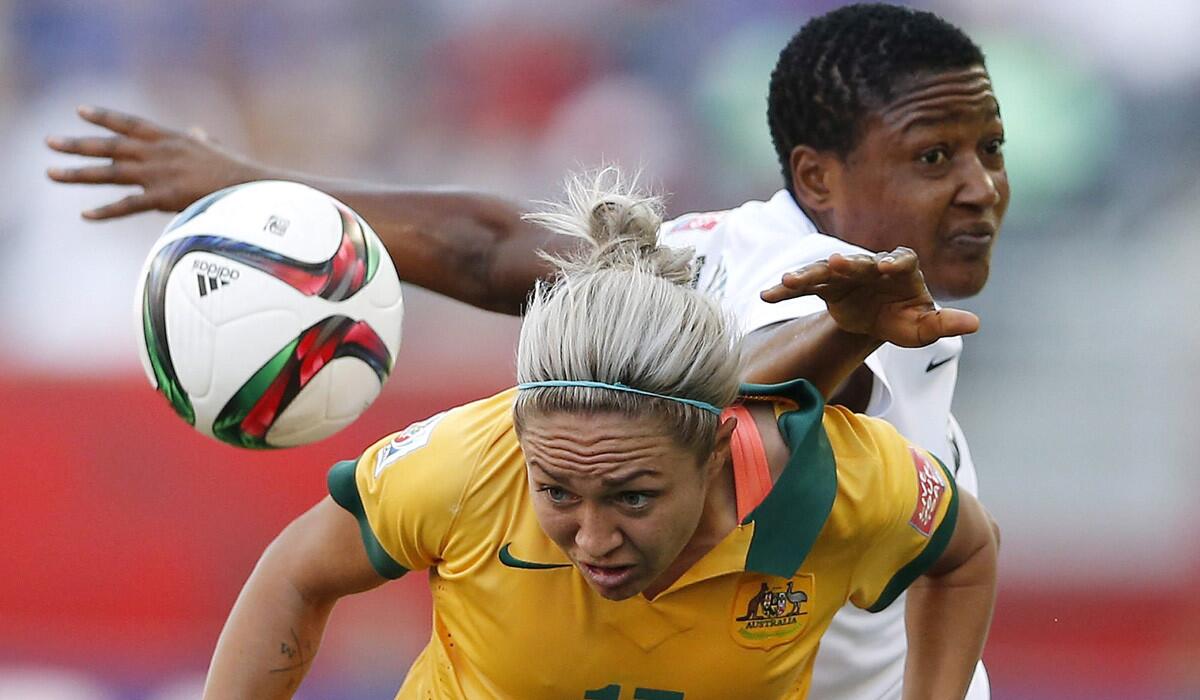Women’s World Cup: Nigeria’s Njoku suspended three games for elbowing

Australia’s Kyah Simon, left, and Nigeria’s Ugo Njoku go for the ball during a FIFA Women’s World Cup match on Sunday. Njoku is expected to get a lengthy suspension for elbowing Australia’s Samantha Kerr during the match.
- Share via
Reporting from Vancouver, Canada — Nigeria will be short-handed when it meets the U.S. on Tuesday in the final game of Women’s World Cup group play after FIFA suspended Ugo Njoku for three games for elbowing Australia’s Samantha Kerr in a group-play game last Friday.
Njoku was also fined the equivalent of $3,200.
A second-half substitute, Njoku was standing with her back to Kerr in the 76th minute of Australia’s 2-0 win when she drove her right elbow into Kerr’s face, knocking her to the turf. Kerr, who was originally thought to have a broken jaw, was attended to by trainers but finished the game. She is expected to play Tuesday against Sweden.
“It was quite vicious,” Kerr said of the unprovoked, off-the-ball play.
The Australian bench brought the incident to the attention of French referee Stéphanie Frappart, but Frappart did not see the incident and no action was taken against Njoku during the game.
After the game, Nigerian Coach Edwin Okon said the elbowing was accidental, though video replays contradicted that.
“It was not deliberate,” Okon said. “It’s a game of contact. I don’t think any player would do that on their own with their elbow.”
Privately, however, the Nigerian soccer federation is said to be deeply embarrassed by the incident, with officials sternly scolding the team.
Nigeria will enter the final day of pool play at the bottom of the Group D table although it still has a chance of advancing with a win over the U.S., a team it has never beaten.
On Sunday, they rested
No World Cup games were played Sunday, the second break in the tournament’s first nine days. The 24 teams already have had as many days off as they have had games.
There are 10 scheduled rest and recovery days in the World Cup, meaning nothing will be happening for a third of the month-long tournament. In the men’s event last summer, there were seven breaks in 32 days, but none during group play. The days off there came between each round of the knockout stage.
“The creation of a match schedule and the decision to confirm tournament dates is a complex process,” a FIFA spokesperson said.
“Various elements have to be taken into account, such as the international match calendar, feedback from associations, availability of stadium and training sites and TV scheduling, among others.”
Also affecting the schedule was the fact that the first two rounds of group games were played as doubleheaders, with all four teams in a particular pool playing on the same day at the same stadium.
In 1994, the last time a men’s World Cup featured 24 teams and 52 matches, it was played over 31 days with eight rest days, none during the group stage.
Twitter: @kbaxter11







